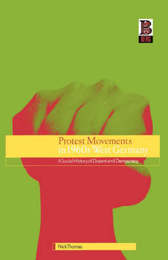
|
Protest Movements in 1960s West Germany: A Social History of Dissent and Democracy
Paperback / softback
Main Details
| Title |
Protest Movements in 1960s West Germany: A Social History of Dissent and Democracy
|
| Authors and Contributors |
By (author) Nick Thomas
|
| Physical Properties |
| Format:Paperback / softback | | Pages:304 | | Dimensions(mm): Height 216,Width 138 |
|
| ISBN/Barcode |
9781859736500
|
| Classifications | Dewey:303.4840943 |
|---|
| Audience | | General | | Professional & Vocational | |
|---|
| Illustrations |
bibliography, index
|
|
Publishing Details |
| Publisher |
Bloomsbury Publishing PLC
|
| Imprint |
Berg Publishers
|
| Publication Date |
1 February 2003 |
| Publication Country |
United Kingdom
|
Description
This social history of protest movements in 1960s Germany departs from the limited and often politically biased reports of participants by placing the protests within the wider contexts of social change and international events. Thomas makes extensive use of archival material, much of which has never been used before, to reconstruct an historical narrative that begins with the peace and anti-nuclear campaigns of the 1950s and moves seamlessly on to the defining events of the 1960s -the Vietnam War, university reform, and the women's movement. Through this original reconstruction, Thomas expertly shows how the protest movements both reflected and influenced fundamental social and political change in post-war Germany. He documents their role in helping to establish a critical and politically mature democracy, despite the escalating violence between protesters and government authorities that culminated in the terrorism of the 1970s. This book is a benchmark publication. Not only is it the first to document these events in English, but it challenges previously biased accounts and offers a much needed reassessment of popular assumptions.
Author Biography
Nick Thomas Lecturer in Twentieth-Century History,University of Nottingham
Reviews'Thomas's account is thorough and extensive, with nice touches of humour from time to time.'Jonathan Osmond, History
|